The Horizons team features many influential Twitter users. This curates a wealth of insights, knowledge, and information about transformation in health and care from other thought leaders across the world.
(Tip: to read an article or watch a video mentioned in a tweet, click on the red text. To view the original tweet, click on the image).
Kathryn will be giving the annual Jo Cox Memorial Lecture at Cambridge University on the 29th November. Details to join are below.

Wellbeing
When you're stressed it may feel like a lot of things in your life are out of your control. Here are a few things you can control:

"If mental health is considered a marker of resilience then this too can be problematic as a number of studies showed that mental health measures such as depression, stress and burnout are not correlated with resilience." You can read the review here.

What are you thankful for? The noun project has built a "Thankful Bot". You insert two words (of things you are thankful for) & it creates a picture. A fun exercise to do with your team.
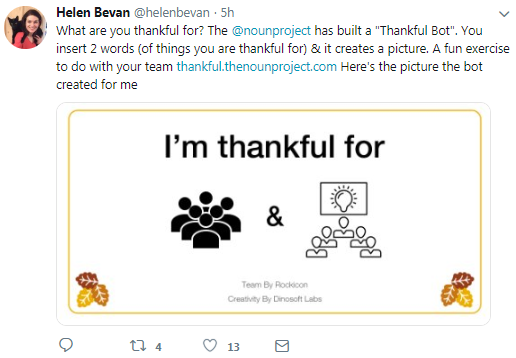
"Don’t get sucked in to what others are staging on social media, focus on your safety and the people you’re with." Read Jason's blog.


All is not lost when things don't work out the way you want...there are positives to be gained.

ProjectA
"You're going to be there when a lot of people are born, and when a lot of people die. In almost every culture, such moments are regarded as sacred and private, made special by a divine presence. No one on earth would be welcomed. But you're personally invited. What an honour that is."
Transforming Perceptions of Nursing and Midwifery
This month's 30 Day Challenge is about developing your local ambassador network. We are working with the Student Nurse Project who are shining a light on the student and newly qualified nurse Ambassadors.
A tweetchat: "Collaboration as an essential leadership skill" was hosted by the Student Nurse Project this week.
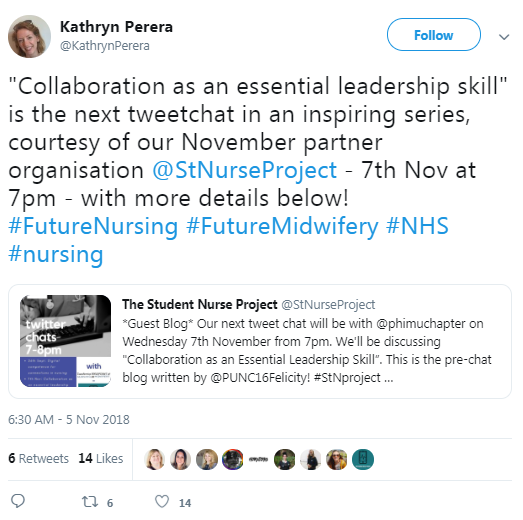
This is a really powerful video by JNJ Global Health showing the impact nurses have had.

We held an event with Capital Nurse this week about recruitment and retention in nursing and midwifery:
Bev hosted an unconference at the same event:
You can register for the 'Men in Nursing and Midwifery Event' taking place on the 13th November in Leicester. It's an opportunity to learn from each other and to look at this group's unique contribution to the January 30 Day Challenge, which will focus on schools.

"There is only one way to look at things until someone shows us how to look at them with different eyes."

Zara started blogging as part of the July challenge and has had influence in ways she wouldn't have imagined. You can read Zara's latest blog here.

Bev recently completed her return to practice at Dudley. You can have your say on the return to practice routes.

Some of our ambassadors celebrated cultural diversity in nursing and midwifery by hosting a 'World at Lunch' special.

Events
Better Births South West
Leigh was the keynote speaker at the Better Births South West conference this week, speaking about change. She also shared her #HugosLegacy story.
The cover of the agenda was a terrific sketchnote:

Leigh wrote a blog post based on her Better Births keynote presentation: From Me to We: Sharing Stories, Working Together, Transforming Services.
Catherine and Leigh facilitated a workshop about reimagining the maternity friends and family test (FFT).
The workshop looked at how the maternity FFT can be made better for women, families, providers and everyone else so that we can achieve better births and positive maternity experience for all.

Improvement and Change
Unknown unknowns; shadow those doing the work; intelligence; embrace the critics; keep it simple; make it fun; operational is strategic; the long haul; and the dream team. Simon Sethi shared his reflections on reducing ED overcrowding.

Never has the need to differently and re-imagine healthcare been more important.
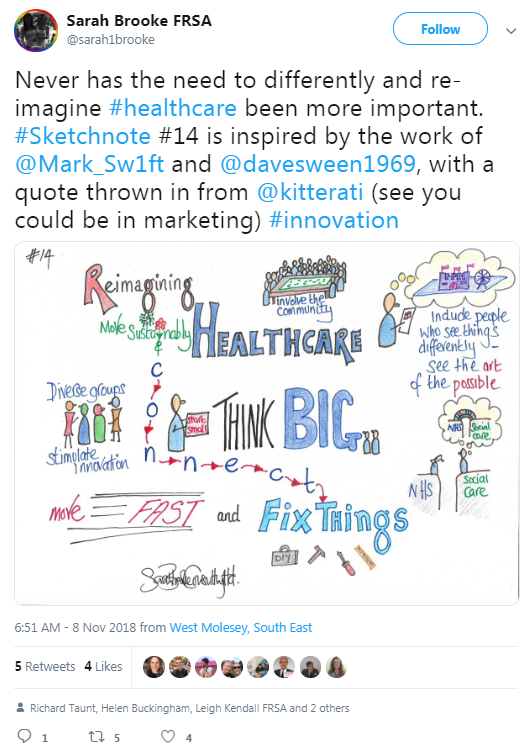
Critical learning from leaders of the great social movements (which can be applied to organisational or system change): If you want to change the world, start with a keystone change.
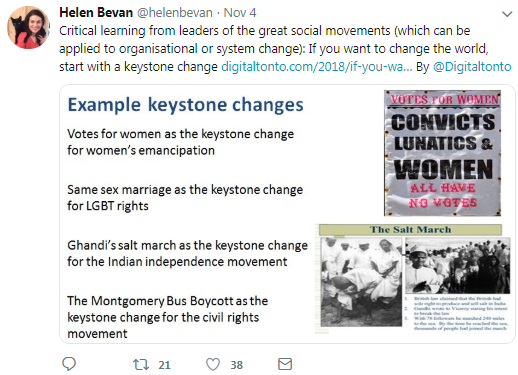
Why you cannot change the world unless you change work first.

When it comes to getting organised for change, we often don’t think about how Change A affects Change B or works against Change C. We confuse activity with progress. So here's how to succeed at complex, continuous change.
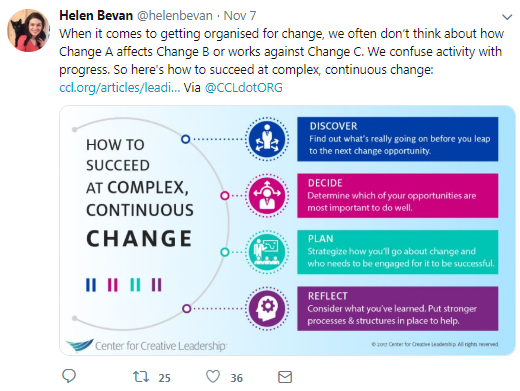
The new mission of the Chief Information Officer: being a change agent.

Large organisations are becoming more bureaucratic, more rule-bound and more centralised. This is untenable. It’s a waste of resources, and it doesn't work. It's time to replace 'bureaucracy' with 'humanocracy' says Gary Hamel.

Taking a post-conventional approach to organisation or system transformation. Less top-down restructuring, technological reboot & process redesign; more mobilising people around identity, building trust and valuing what's good already. Read more here.

The latest research on the characteristics of organisations that deliver most through innovation.

This sketchnote captures a few thoughts on innovation.
For innovators and improvers, it's important that we show that changes that work in a particular setting can be scaled up and benefit many more people. Here's an insightful new resource on evaluating the impact of scaling efforts.

How do we know if we are having an impact in policy change? Here is a five level framework for understanding results from the Tamarack Institute of Canada.
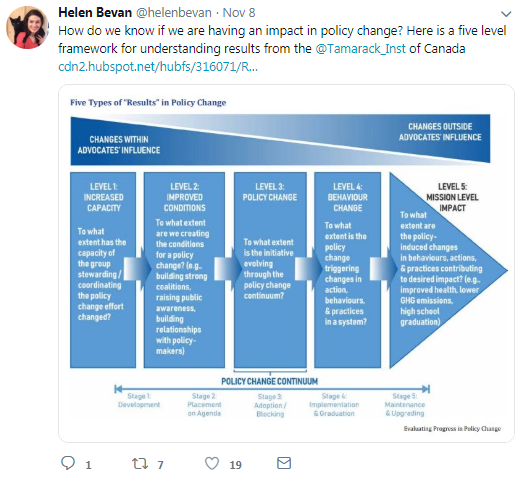
Why do so many digital transformations fail?
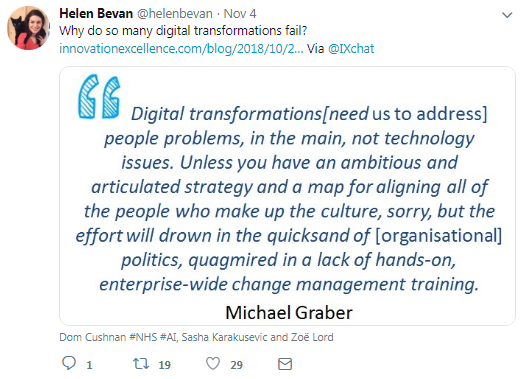
"How to become a Deliberately Development Individual - and why you should bother with it at all."

"There is no evil in things changing, just as there no good in persisting in a new state".

Equal pay day is a symbolic recognition of how little women earn for the same work compared to men.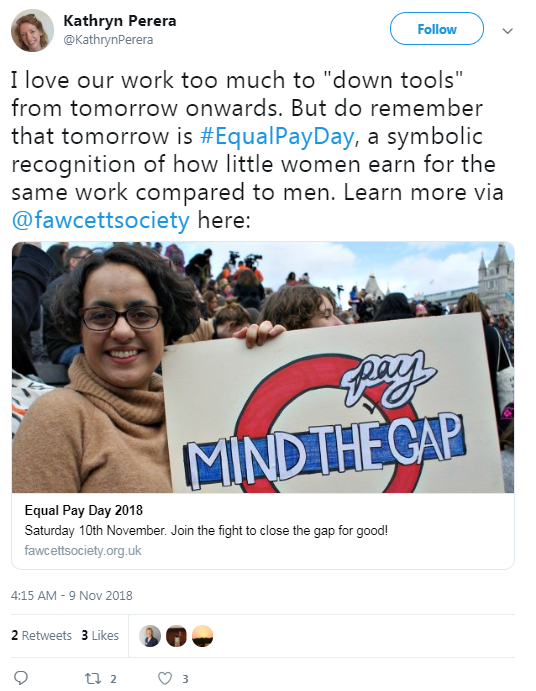
Development
Anyone can draw! Here's how to sketchnote a handshake.

In a social era, our learning happens quickly, from reading some of the massive volume of tweets, Facebook & Insta updates, blogs & other posts that come our way. But if we are to learn deeply, we need to learn slowly.

We often make poor decisions because our brains take mental shortcuts that prevent us from making optimal choices. Here are 18 cognitive biases that can cause havoc with decision making:
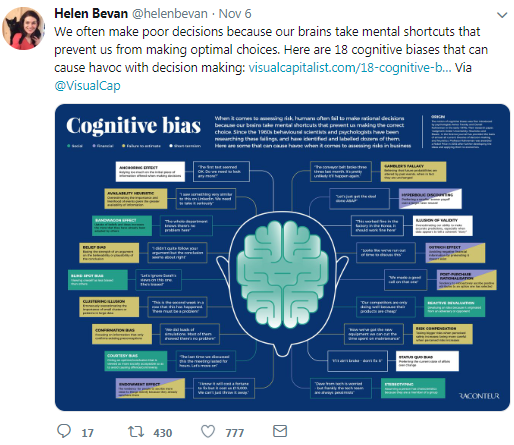
Leadership
What differentiates management from leadership? A thoughtful piece from Leadership Freak which makes some distinctions but says that the boundaries are often blurred. Misconceptions about leadership pollutes our thinking about the value of good management.
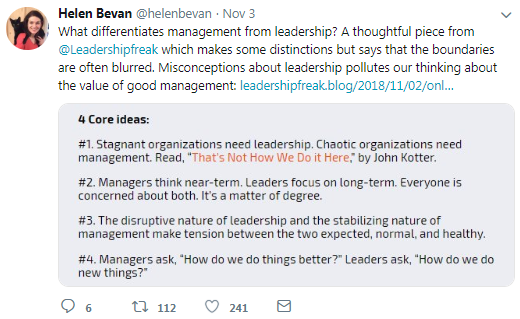
When it comes to organisational change, fairness REALLY matters to people. Leaders need to be able to show that the change process was fair, that people were treated fairly & that the outcomes of the change were fair.
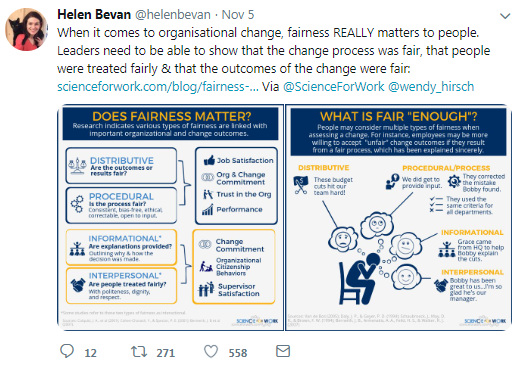
Are you the kind of leaders who encourages critical thinking, prizes sound judgment, values individuality and radiates authenticity? If not your team or organisation may be becoming a cult.











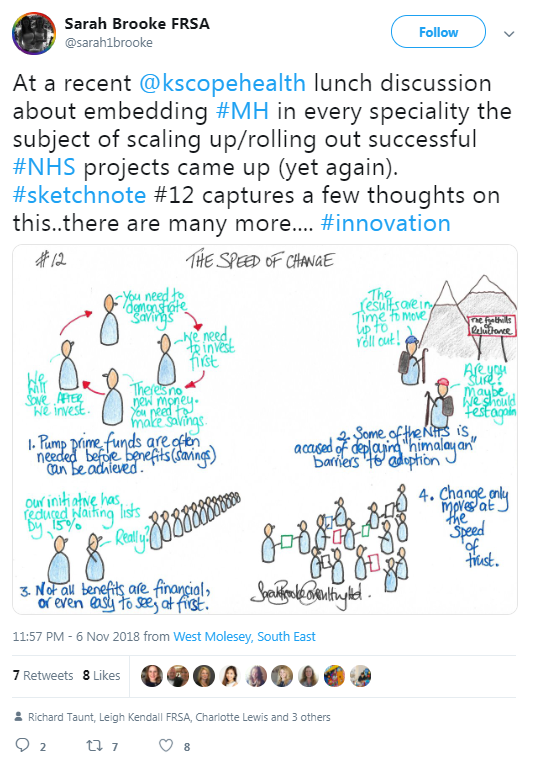

/Passle/5a5c5fb12a1ea2042466f05f/MediaLibrary/Images/6168334917af5b10f4bf1d30/2022-04-14-15-27-52-040-62583d78f636e9115805b2d5.png)
/Passle/5a5c5fb12a1ea2042466f05f/MediaLibrary/Images/6168334917af5b10f4bf1d30/2022-08-05-09-59-36-465-62ecea08f636e906acfed639.jpg)
/Passle/5a5c5fb12a1ea2042466f05f/MediaLibrary/Images/6168334917af5b10f4bf1d30/2022-07-28-14-57-17-405-62e2a3cdf636e9180c9835cb.png)
/Passle/5a5c5fb12a1ea2042466f05f/MediaLibrary/Images/6168334917af5b10f4bf1d30/2022-07-20-10-16-56-533-62d7d618f636ea07987f6668.png)
/Passle/5a5c5fb12a1ea2042466f05f/MediaLibrary/Images/6168334917af5b10f4bf1d30/2022-07-15-09-55-32-858-62d13994f636ea1398e71aa9.jpg)